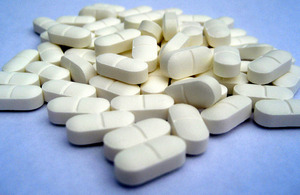'NBOMe' and 'Benzofury' banned
The government has banned 'NBOMe' and 'Benzofury', two groups of 'legal highs'.

Two groups of so-called ‘legal highs’ are to be made illegal
Two groups of so-called ‘legal highs’ have been made illegal for 12 months while government experts assess whether they should be permanently controlled.
Crime Prevention Minister Jeremy Browne today introduced a Temporary Class Drug Order (TCDO) on new psychoactive (NPS) substances known as ‘NBOMe’ and ‘Benzofury’.
Illegal
The drugs have been made illegal for up to 12 months while the government’s independent drug experts, the Advisory Council on the Misuse of Drugs (ACMD) decides whether they should be permanently controlled.
Minister for Crime Prevention Jeremy Browne MP said:
Drugs ruin lives and cause misery to families and communities and the use of this power shows how the UK is leading the way in cracking down on new psychoactive substances.
This temporary class drug order will protect the public and give our independent experts time to prepare advice, while enabling law enforcement partners to target traffickers.
Making drugs illegal is only part of the solution, however. Users of these substances need to understand that although they are described as ‘legal highs’, they are by no means safe.
Advice
Following advice to ministers, the ACMD recommended the government place a TCDO on the NBOMe and Benzofury groups of substances.
The increasing use of these drugs was identified through the Forensic Early Warning System (FEWS), which was put in place to provide an early warning of potentially harmful drugs appearing in the UK by collecting and analysing new substances.
Further evidence was collected at the request of the ACMD through the government’s Drugs Early Warning System (DEWS), a network of health and law enforcement bodies which share information on new substances and provide evidence for the development of policy.
Parliament
The order was laid in Parliament last week and the substances became illegal today (10 June).
This gave the government time to inform law enforcement agencies of the changes and allowed suppliers and manufacturers to dispose of their substances before it became illegal.
Now the order is in effect, those caught making, supplying or importing the drugs face up to 14 years in prison and an unlimited fine under the Misuse of Drugs Act 1971.
Police and border officials will also be allowed to search or detain anyone they suspect of having the drugs and seize, keep or dispose of a substance they think is a temporary class drug.
Leading role
The UK is playing a leading role in the global and EU response to NPS. We have led the introduction of new UN resolutions to encourage international cooperation on NPS monitoring, research, analysis and forensic capability and are working collaboratively with international partners to improve intelligence on the NPS trade.